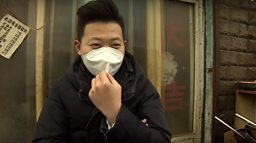The Ethnography Award Winner 2018
The winner of this year’s / Ethnography Award is Anna Lora-Wainwright, Associate Professor in the Human Geography of China at the University of Oxford and author of "Resigned Activism: Living with Pollution in Rural China". (MIT)
The award – for a study that has made a significant contribution to ethnography: the in-depth, descriptive analysis of the life of a culture or sub-culture – has been running since 2014, and is decided by a panel of four academic judges.
Resigned Activism: Living with Pollution in Rural China

Revealing the daily grind of living with pollution in rapidly industrialising, rural China, Anna Lora Wainwright, lived alongside people struggling with nosebleeds and arthritis in village areas with high incidence of cancer. She found activism tempered with resignation: "Pollution affects health... so what? Nobody asked you to be born in this village. Living here has benefits and drawbacks. The drawback is pollution... I live as long as fate allows… so I have to breathe this poison. I don’t care. That’s how I live."
Resigned Activism: Living with Pollution in Rural China, by Anna Lora-Wainwright (MIT Press)
Shortlisted studies
Mobilising for Dalit liberation
How did Dalits, members of India’s lowest caste, shake the political establishment in a South Indian state? Hugo Gorringe’s masterful study charts the empowerment of a hitherto marginalised community: "Time after time they have used Dalit people as a vote bank to be thrown away like a curry leaf after eating. We will not accept such treatment."

Panthers in Parliament: Dalits, Caste and Political Power in South India, by Hugo Gorringe (Oxford University Press).
Testing EU citizenship
Charlotte O’Brien charts the obstacles to equal treatment as EU nationals engage with national welfare systems, facing obstacles at every turn. Drawing on client cases, she offers a cautionary tale to other Member states on the dangers of xenophobic law making: "A lone mother working 16 hours per week deemed not to be a worker, so she and her children were refused housing benefit, child benefit and child tax credit. She started working as a sex worker in order to pay her rent and had to leave her young children unattended at night.'
Unity in Adversity: EU Citizenship, Social Justice and the Cautionary Tale of the UK, by Charlotte O’ Brien (Oxford, Hart Publishing)
Living and dying in a care home
What happens to the imagining and remembering of "home" as older people adjust to living in close proximity to unfamiliar strangers? Janette Davies explores the hidden struggles of residents and care assistants in residential care: "Yesterday he tried to brush his teeth. Today he stared at the toothbrush as if to ask, What is this?... When he can’t do a task I try to accept it. But when he does it easily I make that a joyful occasion."
Living Before Dying: Imagining and Remembering Home, by Janette Davies (Berghahn Books)
Coping with miscarriage in Qatar
During 18 months' fieldwork with Qatari women, Susie Kilshaw uncovered the many and varied understandings of the foetus and the mother’s body in the context of pregnancy loss: "We believe God gives and God takes, and we believe that this will be a bird in heaven. For any mother that loses a baby; this will be a bird and she will see him in the afterlife, so she will not be very depressed that she lost that baby."

Birds, Meat and Babies: the multiple realities of foetuses in Qatar, by Susi Kilshaw in "Anthropology and Medicine" journal
Bringing Ethnography home
How do academics decide what constitutes proper knowledge? Maria do Mar Pereira turns her attention to the corridors and conferences that produce academic knowledge and finds that gender and feminist scholars struggle for recognition: "We managed little by little to get ahead in the battle for more space for research on gender here at the university because we’re so dynamic... we won’t let balls drop... we’ve won some battles, but this continuous fighting is absolutely exhausting."
Power, Knowledge and Feminist Scholarship: an Ethnography of Academia, by Maria do Mar Pereira (Routledge)
Surviving in a Liberian refugee camp
Naohiko Omata restores a voice to the refugees who so often feature as abstract statistics in international policy discussions. Focusing on a Liberian refugee camp in Ghana, she discovers that attempts at self-reliance are thwarted by the economic inequality the preceeded people’s displacement: "In this camp, money is power. Some Liberians receive a lot of money from the US. They behave like a King! They make orders to other people... ’Hey, go and get water’... they are like my boss."
The Myth of Self-Reliance: Economic Lives inside a Liberian Refugee Camp, by Naohiko Omata (Berghahn Books)

-
![]()
Thinking Allowed's partner for this award is the professional association for sociologists in Britain.

